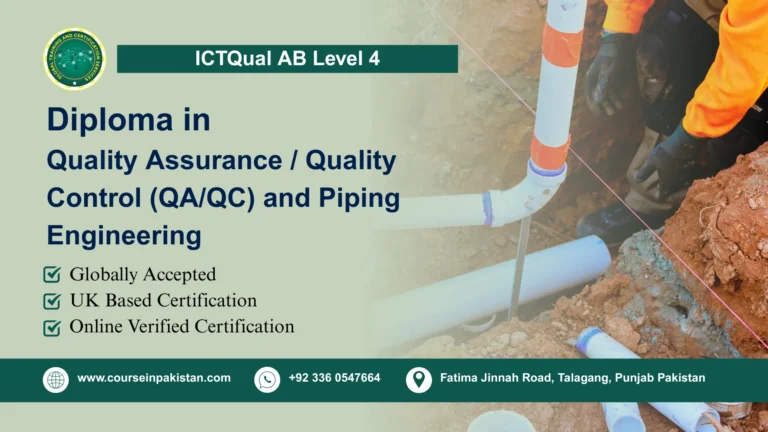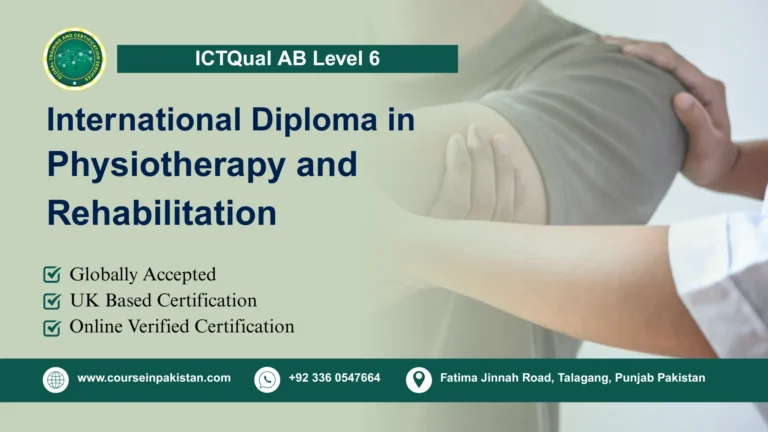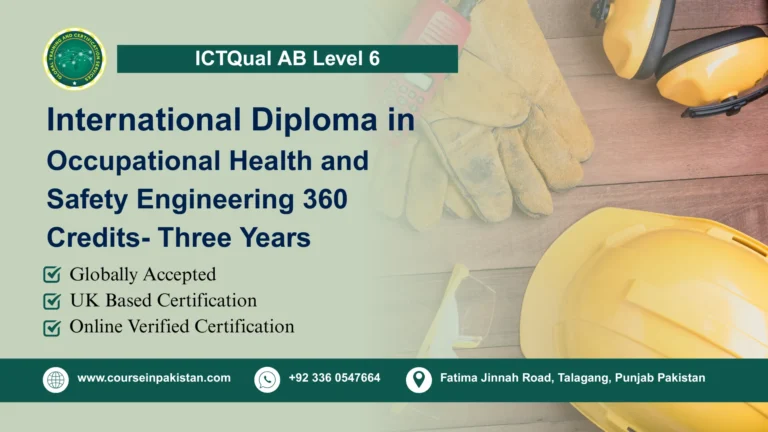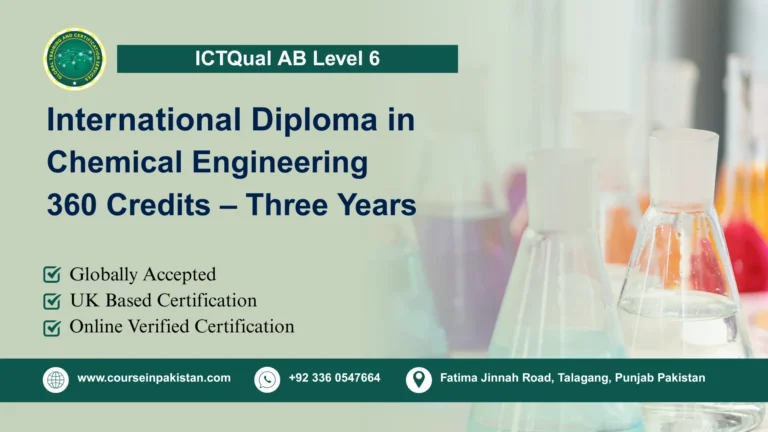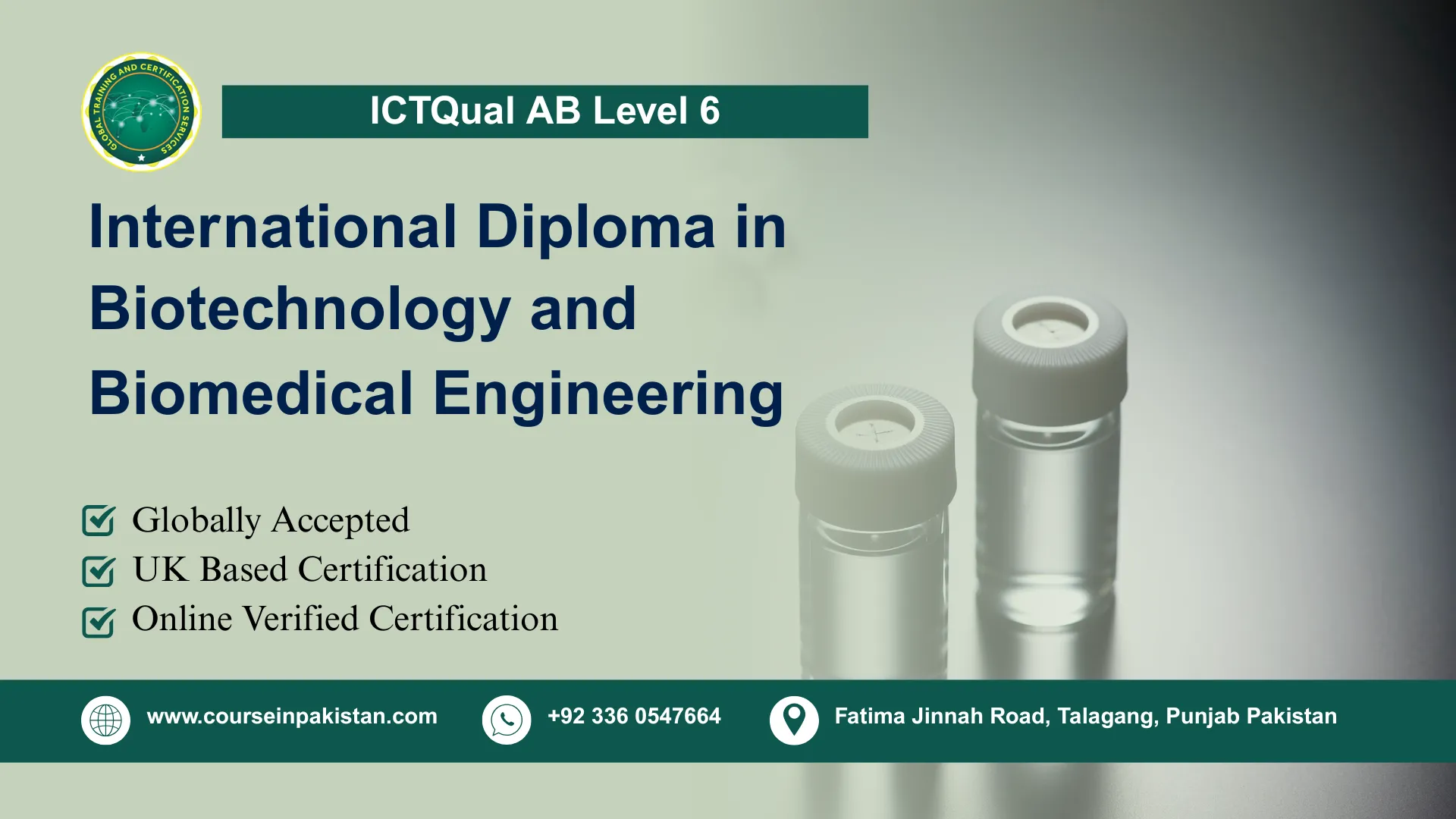
This diploma also emphasizes critical thinking, problem-solving, and research skills essential for biomedical engineering and biotechnology applications. Graduates will be equipped to design and implement biotechnological solutions, develop biomedical devices, and engage in research and development projects.
The ICTQual AB Level 6 International Diploma in Biotechnology and Biomedical Engineering is designed for aspiring scientists, engineers, and healthcare innovators seeking advanced knowledge in the integration of biological sciences with engineering principles. This program provides comprehensive training in biotechnology, biomedical instrumentation, tissue engineering, genetic engineering, and bioprocessing. Learners will gain theoretical knowledge alongside practical laboratory and engineering skills, preparing them to contribute to cutting-edge research, medical device development, and biotechnological innovations.
Course Overview
The ICTQual AB Level 6 International Diploma in Biotechnology & Biomedical Engineering is a 360-credit, fully assignment-based qualification that allows learners to study at their own place from anywhere in the world. This internationally recognized certification is British Council verifiable, MOFA and Embassy attestable, making it ideal for job placement and Iqama approval. It is designed to accommodate both fresh learners and experienced professionals seeking to advance their careers in biotechnology, biomedical engineering, research, or healthcare technology.
Fresh students are required to complete all 36 mandatory assignments within three years, gaining comprehensive knowledge and practical skills in molecular biology, tissue engineering, bioinformatics, bioprocessing, and biomedical device design. Experienced and competent professionals, however, can pursue this certification by submitting verifiable at least six years of relevant experience and demonstrating their expertise through professional discussion meetings with an ICTQual AB approved assessor, enabling them to complete the qualification in a significantly shorter time without completing all mandatory assessments. This flexibility ensures that the program is accessible, practical, and career-focused for learners at all stages of their professional journey.
Key Highlights of the Course:
- Comprehensive training in biotechnology, genetic engineering, and biomedical engineering principles
- Hands-on experience with laboratory techniques, biomedical instrumentation, and research projects
- Focus on bioprocessing, tissue engineering, and innovative healthcare technologies
- Development of analytical, problem-solving, and engineering design skills
- Prepare for professional roles in biotechnology, medical devices, research, and healthcare technology
Course Benefits
1. Career Advancement
- Access professional roles in biotechnology, biomedical engineering, and healthcare technology
- Prepare for specialized and leadership positions in research, medical devices, and biopharmaceuticals
2. Practical Skill Development
- Gain hands-on experience in laboratory techniques, biomedical instrumentation, and experimental design
- Apply biotechnology and engineering knowledge to innovate solutions in healthcare and industry
3. Industry-Recognized Qualification
- Internationally accredited and verifiable diploma
- Enhance employability in biotechnology companies, research laboratories, and healthcare technology sectors
4. Technical and Analytical Expertise
- Develop critical thinking, data analysis, and problem-solving skills
- Design, test, and implement biomedical engineering solutions and biotechnological innovations
5. Contribution to Healthcare and Research
- Support advancements in medical devices, tissue engineering, and biopharmaceutical applications
- Engage in research, quality assurance, and innovation projects in biotechnology and biomedical fields
Course Study Units
This qualification, the ICTQual AB Level 6 International Diploma in Biotechnology & Biomedical Engineering 360 Credits – Three Years, consists of 36 mandatory units.
Year 1: Foundation in Biotechnology & Biomedical Engineering
- Introduction to Biotechnology and Biomedical Engineering
- Fundamentals of Human Anatomy and Physiology
- Principles of Molecular Biology and Genetics
- Biochemistry for Life Sciences
- Microbiology and Infection Control
- Laboratory Safety and Quality Assurance
- Principles of Pharmacology and Therapeutics
- Mathematics and Statistics for Biomedical Applications
- Computer Applications in Biotechnology
- Communication Skills for Science and Healthcare Professionals
- Introduction to Research and Evidence-Based Practice
- Ethics and Professional Conduct in Biomedical Sciences
Year 2: Intermediate Biotechnology & Biomedical Engineering Applications
- Genetic Engineering and Recombinant DNA Technology
- Cell Biology and Tissue Engineering
- Clinical Biochemistry and Diagnostic Techniques
- Immunology and Serology
- Instrumentation and Analytical Methods in Biotechnology
- Microbial Biotechnology and Industrial Applications
- Molecular Diagnostics and Laboratory Techniques
- Bioprocess Engineering and Biomanufacturing
- Data Analysis and Biomedical Informatics
- Health and Safety in Biomedical Laboratories
- Leadership and Teamwork in Scientific Practice
- Applied Research Methods and Experimental Design
Year 3: Advanced Specialisation and Professional Application
- Advanced Molecular Biology and Genomics
- Advanced Immunology and Clinical Applications
- Biomedical Device Engineering and Design
- Advanced Bioprocessing and Biopharmaceutical Production
- Stem Cell Technology and Regenerative Medicine
- Bioinformatics and Computational Biology
- Clinical Trial Design and Regulatory Compliance
- Advanced Laboratory Techniques and Automation
- Quality Management and Risk Assessment in Biomedicine
- Emerging Technologies in Biotechnology and Healthcare
- Research Project / Dissertation
- Professional Practice and Practical Competency Assessment
Learning Outcomes
Year 1 – Foundation in Biotechnology & Biomedical Engineering
1. Introduction to Biotechnology and Biomedical Engineering
- Understand the principles, scope, and applications of biotechnology and biomedical engineering
- Identify career pathways and professional roles in the field
- Apply foundational knowledge to laboratory and clinical settings
2. Fundamentals of Human Anatomy and Physiology
- Describe human body structure and function
- Relate physiological processes to biomedical applications
- Apply anatomical and physiological knowledge to problem-solving in healthcare technology
3. Principles of Molecular Biology and Genetics
- Understand molecular mechanisms of DNA, RNA, and protein synthesis
- Explain gene expression, regulation, and inheritance
- Apply genetic principles in research, diagnostics, and biotechnology
4. Biochemistry for Life Sciences
- Understand chemical and metabolic processes in living organisms
- Apply biochemical knowledge to biomedical and biotechnological applications
- Interpret biochemical data to support laboratory and research work
5. Microbiology and Infection Control
- Identify microorganisms and their role in health and disease
- Apply microbiological techniques for detection and control
- Implement infection prevention strategies in laboratory and healthcare settings
6. Laboratory Safety and Quality Assurance
- Follow safety protocols and hygiene standards in biomedical labs
- Conduct risk assessments and quality checks
- Ensure compliance with health, safety, and regulatory requirements
7. Principles of Pharmacology and Therapeutics
- Understand basic drug actions, pharmacokinetics, and pharmacodynamics
- Apply therapeutic knowledge to biomedical research and clinical applications
- Analyze drug interactions and effects on human physiology
8. Mathematics and Statistics for Biomedical Applications
- Apply mathematical concepts to biomedical measurements and calculations
- Use statistical methods for data analysis and interpretation
- Support evidence-based conclusions in experiments and research
9. Computer Applications in Biotechnology
- Utilize software for data collection, analysis, and modeling in biomedical research
- Apply computational tools to laboratory workflows
- Enhance accuracy, efficiency, and reproducibility of experiments
10. Communication Skills for Science and Healthcare Professionals
- Communicate scientific information effectively in written and verbal formats
- Document laboratory findings clearly and professionally
- Collaborate with multidisciplinary teams in healthcare and research settings
11. Introduction to Research and Evidence-Based Practice
- Understand research methodology and scientific inquiry
- Critically evaluate research studies and evidence
- Apply research findings to practical biomedical and laboratory applications
12. Ethics and Professional Conduct in Biomedical Sciences
- Understand ethical principles in research and clinical practice
- Apply professional standards in laboratory and healthcare settings
- Evaluate ethical dilemmas and make informed decisions
Year 2 – Intermediate Biotechnology & Biomedical Engineering Applications
13. Genetic Engineering and Recombinant DNA Technology
- Apply techniques for gene cloning, editing, and manipulation
- Understand recombinant DNA applications in research and therapeutics
- Analyze genetic engineering data and its implications
14. Cell Biology and Tissue Engineering
- Understand cell structure, function, and behavior
- Apply principles of tissue culture and regenerative medicine
- Develop skills in designing and engineering biological tissues
15. Clinical Biochemistry and Diagnostic Techniques
- Perform biochemical assays for clinical diagnostics
- Interpret laboratory results to support disease detection and management
- Apply laboratory techniques to patient care and research
16. Immunology and Serology
- Understand immune system function and mechanisms
- Apply serological techniques for diagnostics and research
- Analyze immunological test results for clinical applications
17. Instrumentation and Analytical Methods in Biotechnology
- Operate laboratory instruments and analytical equipment effectively
- Conduct quantitative and qualitative analyses
- Interpret data for research, diagnostics, and quality assurance
18. Microbial Biotechnology and Industrial Applications
- Apply microbial techniques for industrial and biotechnological purposes
- Understand fermentation, enzyme production, and microbial bioprocessing
- Evaluate microbial applications in healthcare, agriculture, and industry
19. Molecular Diagnostics and Laboratory Techniques
- Use molecular methods for disease detection and genetic analysis
- Perform DNA/RNA amplification, sequencing, and analysis
- Interpret molecular data for research and clinical decision-making
20. Bioprocess Engineering and Biomanufacturing
- Apply engineering principles to the production of biological products
- Understand scaling, optimization, and process control in biomanufacturing
- Analyze data to ensure product quality and efficiency
21. Data Analysis and Biomedical Informatics
- Manage and analyze biomedical datasets
- Apply computational tools and bioinformatics techniques
- Use data to inform research, diagnostics, and therapeutic strategies
22. Health and Safety in Biomedical Laboratories
- Implement advanced safety protocols in laboratory environments
- Manage hazardous materials and biological specimens safely
- Ensure compliance with regulatory standards and best practices
23. Leadership and Teamwork in Scientific Practice
- Develop leadership and collaborative skills in research and laboratory teams
- Manage projects and resources effectively
- Promote professional development and effective team communication
24. Applied Research Methods and Experimental Design
- Design and conduct experiments using rigorous scientific methodology
- Collect, analyze, and interpret experimental data
- Apply findings to biomedical research and industrial applications
Year 3 – Advanced Specialisation and Professional Application
25. Advanced Molecular Biology and Genomics
- Analyze complex genomic data and molecular mechanisms
- Apply genomics techniques in research, diagnostics, and therapy
- Interpret results for clinical and biotechnological applications
26. Advanced Immunology and Clinical Applications
- Conduct advanced immunological assays and experiments
- Understand clinical applications of immunology in diagnostics and therapy
- Apply immunology knowledge to patient care and research innovations
27. Biomedical Device Engineering and Design
- Design and develop biomedical devices and instrumentation
- Apply engineering principles to optimize device performance
- Evaluate safety, functionality, and regulatory compliance
28. Advanced Bioprocessing and Biopharmaceutical Production
- Implement advanced techniques in production of biopharmaceuticals
- Optimize bioprocesses for efficiency, quality, and scalability
- Ensure compliance with regulatory and quality standards
29. Stem Cell Technology and Regenerative Medicine
- Understand stem cell biology and therapeutic applications
- Apply laboratory techniques for regenerative medicine research
- Evaluate ethical and clinical considerations in stem cell therapies
30. Bioinformatics and Computational Biology
- Apply computational methods to analyze biological data
- Use bioinformatics tools for genomics, proteomics, and systems biology
- Interpret complex datasets to support research and clinical decision-making
31. Clinical Trial Design and Regulatory Compliance
- Understand clinical trial phases, design, and methodology
- Apply regulatory standards and ethical considerations in trials
- Evaluate trial data for research and therapeutic development
32. Advanced Laboratory Techniques and Automation
- Operate automated laboratory systems and high-throughput instrumentation
- Implement advanced techniques for efficient and accurate testing
- Ensure quality control in automated laboratory processes
33. Quality Management and Risk Assessment in Biomedicine
- Apply quality management principles to laboratory and biopharmaceutical processes
- Conduct risk assessments and implement mitigation strategies
- Ensure compliance with international standards and best practices
34. Emerging Technologies in Biotechnology and Healthcare
- Explore innovations in biotechnology, medical devices, and healthcare solutions
- Evaluate the impact of emerging technologies on research and clinical applications
- Apply new technologies to improve healthcare and laboratory practices
35. Research Project / Dissertation
- Conduct independent research in biotechnology or biomedical engineering
- Apply scientific methodology and experimental design rigorously
- Present findings in structured reports and professional presentations
36. Professional Practice and Practical Competency Assessment
- Demonstrate practical competence in real-world laboratory and biomedical engineering settings
- Apply theoretical knowledge to experimental and clinical scenarios
- Evaluate performance, integrate feedback, and reflect on professional development
Who is This Course For?
The ideal learner for ICTQual AB Level 6 International Diploma in Biotechnology and Biomedical Engineering is someone who:
- Has a strong interest in biotechnology, biomedical engineering, and healthcare innovation
- Seeks to develop advanced practical and analytical skills in laboratory and engineering applications
- Desires a career in biopharmaceuticals, medical devices, regenerative medicine, or research institutions
- Wants to gain expertise in molecular biology, tissue engineering, bioinformatics, and bioprocessing
- Is motivated to uphold quality standards, laboratory safety, and professional ethics in biomedical sciences
Future Progression
Graduates of this course can pursue:
- Specialist and senior roles in biotechnology, biomedical engineering, and healthcare technology industries
- Careers in research and development, molecular diagnostics, and regenerative medicine
- Leadership and management positions in laboratories, biopharmaceutical production, or medical device companies
- Opportunities in regulatory affairs, clinical trials, and quality assurance for biomedical innovations
- Academic or consultancy roles, including further research or innovation projects in biotechnology
Academic Pathways:
- Learners completing this diploma may continue to:
- Master’s programs in Biotechnology, Biomedical Engineering, Molecular Biology, or Bioinformatics
- Professional certifications in Biopharmaceutical Production, Tissue Engineering, or Biomedical Device Design
- Postgraduate diplomas in Clinical Diagnostics, Laboratory Management, or Bioprocess Engineering
- Research-based programs or PhD studies in biomedical sciences, healthcare technologies, or translational research
Conclusion
The ICTQual AB Level 6 International Diploma in Biotechnology & Biomedical Engineering equips learners with comprehensive theoretical knowledge, practical skills, and professional competencies required for innovation and excellence in biotechnology and biomedical engineering. Graduates are prepared to design and implement biotechnological solutions, develop biomedical devices, conduct advanced research, and contribute to healthcare innovation globally. This internationally recognized qualification enhances career opportunities, fosters leadership, and empowers learners to excel in clinical, industrial, and research environments.

